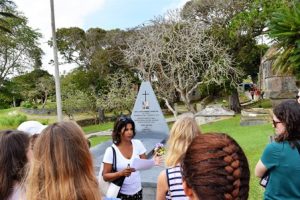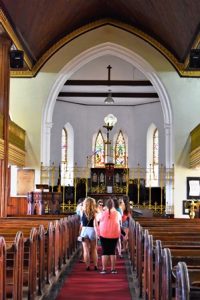
Submitted by Ana Ramirez-Irineo on the 2017 winter session program in Barbados sponsored by the Department of Human Development and Family Studies…
As a first generation college student and minority, I never expected I would be studying abroad, especially on a beautiful island. The service-learning study abroad program that I have decided to participate in has proved to be valuable and well worth it within the first week.
Barbados is a gorgeous island, but its people have demonstrated that it is they who complete the island. Barbadians, also locally called Bajans, have impressed me with their friendliness and welcoming attitude towards others and each other. As I walk through Holetown, you can hear and see the community emanating through the warm-hearted greetings Bajans give out across the street or from within their vehicles. The bus drivers and private transportation services even have a two-beep greeting system when they see each other on the street. Everyone just seems to know each other and enjoy long conversations with others while on the street or in the grocery store. Their amiable behavior is a stark contrast to the United States’ general behavior with each other and others. In the United States, many seem to be wary of others while on the street so that they confuse a stranger’s friendly hello with danger, but in Barbados you cannot help, but say hello and engage in conversation with the locals.
but say hello and engage in conversation with the locals.
On our first week in Barbados, we had two activities scheduled by our professor, Dr. Gaines-Hanks, that enhanced our understanding of Bajan culture. The first event was a cultural excursion on a historical tour of the island. Joann was our tour guide and from my understanding, she has been the guide for Dr. Gaines-Hanks since the beginning. Barbados is divided into 11 parishes and each parish has its own parish church. On the tour, not only was I able to witness Barbados’ beauty, I was able to enter the gorgeous parish church of St. John and walk through time at Sunbury, a plantation house. Sunbury illustrated almost exactly what life on a sugar cane estate would be like in the 18th and 19th centuries. It was neat to see artifacts from that time period and casually walk through the house as if I was present during those times. The historical tour reminded me of the reason why I am here. This study abroad program is not about sunbathing by the pool or relaxing by the beach, it is about volunteering and learning from the culture as well as skills that will benefit me as a human services worker. The service-learning study abroad program is all about reciprocity and both parties benefiting from this program. I did not come to Barbados as a tourist, but as a willing, participating member of its society for a short amount of time. Who knows? Maybe I will come back and embrace Barbados as my new home.
The second activity was a guest lecturer on the culture of Barbados. Ian Walcott-Skinner was a fountain of valuable information. His lecture was interactive and he encouraged students to ask questions. Unfortunately, I am quite shy in class most of the time and it takes me a while to acclimate so when he called on me to ask if I had a comment, I regrettably said no. The guest lecturer activity has made me realize that I am all too quiet during class and this affects my participation and ultimately my learning experience. However, I have made it my goal to participate more and prepare questions or comments before class or any activity so I can add to the discussion. This goal could also benefit me when I return to UD because I will have built up the confidence to ask questions and make worthwhile discussion during lectures.

The service-learning study abroad program to Barbados has confirmed its significance and as I reflect on this first week, I hope many other students who are first generation and or minorities take the opportunity to study abroad seriously and commit. It is an experience like no other and I wholeheartedly hope more students can embark on this journey that before they may not have considered due to costs or the thought of not being accepted. I am forever grateful to be on this service-learning program and will continue to look back on this adventure for years to come. I cannot wait to begin my placement at the HIV/AIDS Commission this Tuesday. I cannot wait to start the service part of this service-learning study abroad program.



